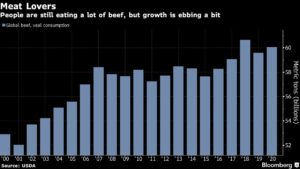Bloomberg writers Lydia Mulvany and Isis Almeida reported yesterday that, “The American beef industry, wary of the vegan-burger craze that’s sweeping the nation, is trying to scrub its image as a greenhouse-gas-emitting machine.
“With big retailers and investors pressing companies to improve their footprints, giants like Tyson Foods Inc. and Cargill Inc. are promising ambitious reductions in emissions, including in supply chains. Chief sustainability officers are popping up all over meat C-suites, and social media ads are touting beef’s misunderstood health benefits.”

“Beef Industry Battles to Scrub Polluter Image as Vegan Burgers Boom,” by Lydia Mulvany and Isis Almeida. Bloomberg News (November 24, 2019).
The article pointed out that, “It’s an uphill battle. For more than a decade, studies have piled on exhorting people to eat less beef for environmental and health reasons. By some measures, agriculture accounts for more global greenhouse gas emissions than transport, thanks in part to livestock production.”
Mulvany and Almeida noted that, “But the industry is pointing to new numbers that show how efficient American production is compared with the rest of the world. A recent government study funded by the industry pinpointed U.S. beef’s footprint at about 3% of man-made greenhouse gases, paltry compared with the 14.5% global number that’s often cited.”
The Bloomberg article added that, “Ermias Kebreab, a professor of animal science at University of California-Davis, said that major reductions in emissions are achievable over the next five years given the promise of imminent feed additives that reduce the amount of methane cattle produce.”

